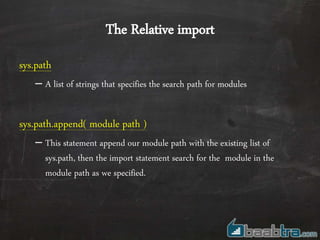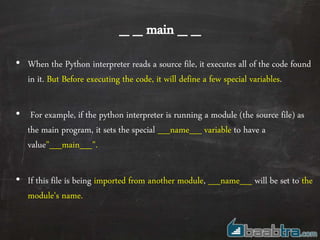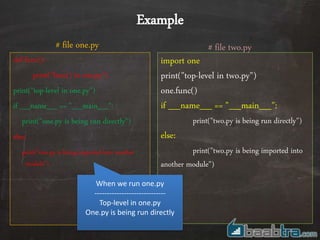This document provides an introduction to object-oriented programming in Python. It discusses key concepts like classes, instances, inheritance, and modules. Classes group state and behavior together, and instances are created from classes. Methods defined inside a class have a self parameter. The __init__ method is called when an instance is created. Inheritance allows classes to extend existing classes. Modules package reusable code and data, and the import statement establishes dependencies between modules. The __name__ variable is used to determine if a file is being run directly or imported.





![Inheritance
Syntax
Derived_class(Base class_name[,Base class_name1][,Base class_name2][,...])
Example
class Baabte:
def amethod(self): print "Baaabte"
class Baabtra(Baabte):
def amethod(self): print "Baabtra“
aninstance = Baaabtra ( )
aninstance.amethod( ) # prints Baabtra](https://image.slidesharecdn.com/objectorientedprogramminginpython-140811113331-phpapp02/85/Object-oriented-programming-in-python-6-320.jpg)

![The import Statement
Syntax
import modname [as varname][,...]
Example
import MyModule1
import MyModule as Alias](https://image.slidesharecdn.com/objectorientedprogramminginpython-140811113331-phpapp02/85/Object-oriented-programming-in-python-8-320.jpg)
![The import Statement
Syntax
import modname [as varname][,...]
Example
import MyModule1
import MyModule as Alias
In the simplest and most
common case, modname is an
identifier, the name of a variable
that Python binds to the module
object when the import
statement finishes](https://image.slidesharecdn.com/objectorientedprogramminginpython-140811113331-phpapp02/85/Object-oriented-programming-in-python-9-320.jpg)
![The import Statement
Syntax
import modname [as varname][,...]
Example
import MyModule1
import MyModule as Alias
looks for the module named
MyModule and binds the
variable named Alias in the
current scope to the module
object. varname is always a
simple identifier.](https://image.slidesharecdn.com/objectorientedprogramminginpython-140811113331-phpapp02/85/Object-oriented-programming-in-python-10-320.jpg)
![The from Statement
Syntax
from modname import attrname [as varname][,...]
from modname import *
example
• from MyModule import f](https://image.slidesharecdn.com/objectorientedprogramminginpython-140811113331-phpapp02/85/Object-oriented-programming-in-python-11-320.jpg)
![The from Statement
Syntax
from modname import attrname [as varname][,...]
from modname import *
example
• from MyModule import f Importing only one attribut
which is named as ‘f’](https://image.slidesharecdn.com/objectorientedprogramminginpython-140811113331-phpapp02/85/Object-oriented-programming-in-python-12-320.jpg)










